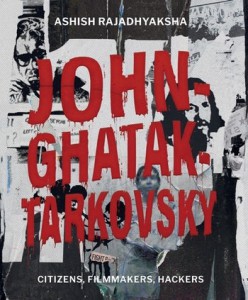John–Ghatak–Tarkovsky
Citizens, Filmmakers, Hackers


Moyenne des votes : ![]()
| 0 | vote | |
| 0 | vote | |
| 0 | vote | |
| 0 | vote |
Votre vote : -
Description de l'ouvrage:
In 2015, students of the Film & Television Institute of India took cinema to the streets with a strike, which was among the first of the agitations that raged across India's universities at that time. As the right to make and show films became central to defining freedom on the campus, a new role emerged for the moving image. The names of Eisenstein and Pudovkin, John Abraham, Tarkovsky and Ghatak, recited in slogans and displayed on banners, evoked a history of political cinema that had set itself against the might of India's political establishment. This book tells the longer cinematic history of a technological and political transformation, redefining cinema amidst growing state totalitarianism and a new era in political struggle.
Published in association with Sher-Gil Sundaram Arts Foundation
À propos de l'auteur :
Ashish Rajadhyaksha is an independent scholar and curator. He is the author of several books such as Indian Cinema in the Time of Celluloid: From Bollywood to the Emergency (2009) and Encyclopaedia of Indian Cinema (with Paul Willemen) (1994). Among his curatorial projects are (with Geeta Kapur) Bombay-Mumbai 1992–2001 (Century City, Tate Modern, 2001) and Tah-Satah: A Very Deep Surface (Jawahar Kala Kendra, Jaipur, 2017).
Revue de Presse:
provides a nuanced insight into the historic protest carried out by the students of the Film and Television Institute of India (FTII) in 2015, and examines the socio-political impact of the movement on the much larger, nationwide protests that followed in the next five years. Suhrid Sankar Chattopadhyay, Frontline
Offers an immersive reading experience best characterised as polyphonic and post-modern. Rajadhyaksha’s text is accompanied by screen grabs from student diploma films, campaign posters, maps, photographs of official communication locked away in files, and QR codes that can be scanned to read, watch and listen to various kinds of source material. Clearly, it deserves thoughtful engagement. Chintan Girish Modi, Business Standard
Voir le site internet de l'éditeur Tulika Books
> Du même auteur :
Kumar Shahani (2015)
The Shock of Desire and Other Essays
de Kumar Shahani et Ashish Rajadhyaksha
Sujet : Director > Kumar Shahani
> Sur un thème proche :
Resistance in Indian Documentary Film (2024)
Aesthetics, Culture and Practice
Dir. Shweta Kishore et Kunal Ray
Popular Cinema and Politics in South India (2017)
The Films of MGR and Rajinikanth
Film and Politics in India (2015)
Cinematic Charisma as a Gateway to Political Power
Mourning the Nation (2009)
Indian Cinema in the Wake of Partition
The Indian Partition in Literature and Films (2019)
History, Politics, and Aesthetics
Dir. Rini Bhattacharya Mehta et Debali Mookerjea-Leonard
Sujet : Countries > South Asia